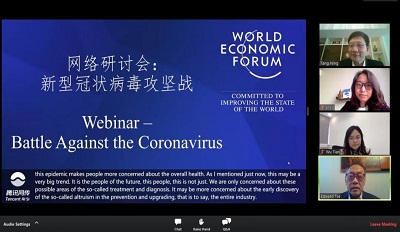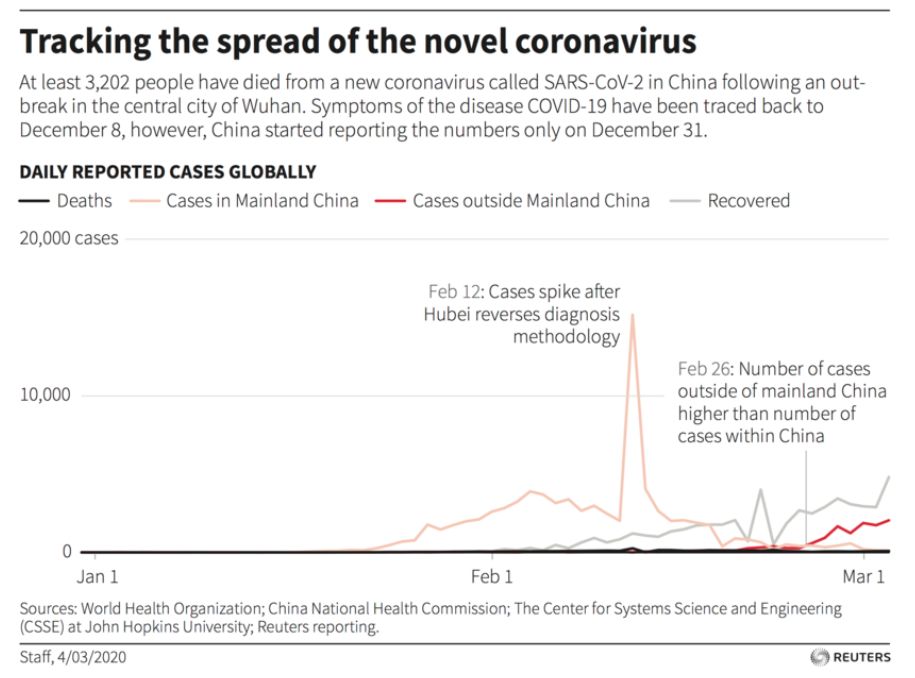2月25日,达沃斯世界经济论坛(WEF)举办了有关新冠病毒疫情的网络研讨会。高风咨询CEO谢祖墀博士和其他三位嘉宾一起参与了线上讨论。
以下是谢博士分享的主要观点:
当今,安全、健康的居住环境被视为与经济增长同等重要,甚至更为重要的部分。疾病的早期预防与发现措施对未来的公共管理体系至关重要。在本次疫情中,中国已证明了其体系的有效性,在其中,私营部门的贡献至关重要。这体现出了公私合营模式的潜力与必要性。
此次疫情加速了新兴科技的应用。社交模式变得多样化,为更有效、在线的交流模式留出空间。这方面的探索同时也塑造了私营部门的创业家精神。许多公司不仅只看利益,它们同时也渴望为社会创造福利。
这些变化为不同行业带来了多种机遇,如下所述:
- 新商业模式在涌现,尤其是在健康,物流,自动化,在线办公室,娱乐,零售和教育等领域。
- 新一代智慧城市是未来公共议程的关键。除了提供基础的城市功能外,新一代智慧城市还将通过整合供应链、交通运输系统、应急措施和灾难预警来系统地增强公共管理。
- 大数据将被更广泛地应用于公共福利,尤其是用于提升追踪和分析的效率,并支持更快速的公共决策制定。
- 原本以线下为主的商业向线上转移,尤其在教育、娱乐及零售领域。
- 医疗产业的价值链将扩展到涵盖疫病的预防和早期发现。未来其应用场景将包括更多的参与者,并帮助公共卫生议程构建完善的生态。
社交媒体不仅再仅是C2C与B2C之间沟通的桥梁,它也成为民众与政府间的沟通渠道(G2C和C2G)。
原文报道 (由WEF整理)
Coronavirus in China – insights on the impacts and opportunities for change
- The crisis has built the basis for more professional and transparent public-private partnerships in China.
- Investors could seize opportunities in the long-term trend of technological innovation and capital market reform.
- The entrepreneurial spirit is now vital to Chinese businesses.
The recent outbreak of COVID-19 in China has led to significant impacts on businesses and industries. Through a webinar hosted by the World Economic Forum Beijing Office, here are the insights from top-level Global Future Council members, business and media leaders on how China is reacting to mitigate the impacts, adapt to the changes, and preparing for the bounce back in new opportunities.
China’s government becomes more transparent
Financial market policies and outlook
Zhu Ning, Deputy Dean of Shanghai Advanced Institute of Finance, noted that the scale and global impact of the outbreak have exceeded that of SARS in 2003. As China tries to balance imperatives between disease control, economic recovery and population movement, annual GDP growth is expected to slow down to between 5 and 5.5% for 2020. 2020 is the final year of China’s 13th Five Year Plan period and holds certain economic growth targets to meet. It remains to be seen whether major policy adjustments will be made by the government.
2020 is the final year of China’s 13th Five Year Plan period and holds certain economic growth targets to meet. It remains to be seen whether major policy adjustments will be made by the government.
Meanwhile, measures have been taken on key aspects of economic policy. For monetary policy, the central bank has relaxed the reserve requirement ratio and the loan prime rate. However, a new cycle of global interest rate cuts initiated by the US Federal Reserve to address the stock market fall, are yet to be announced. On fiscal policy, there are tax and rent reductions, deferred payments of social security and target funding. On a regional level, local governments have introduced policies for returning to work and production.
Though widely expected, it is unlikely that there will be another stimulus plan similar to the “2008 RMB 4 trillion”, considering the present economic scale of China. The price of bulk commodities, such as gold, has increased. But with limited choices of infrastructure projects and the restrained policy on house prices, a great surge is unlikely. Considering that China now verges towards a top margin of inflation, the intensity of new monetary policies and its impact on commodity prices need further observation.
Investment sentiment is running high. The stock market surged due to expectations of stimulus policies and limited choices of investment. The number of investors in China’s A-Share market increased over 10 million in recent months. As the global market starts to respond to the outbreak, the fervent scene of the domestic market needs more caution.
On this point, Tang Ning, Founder and CEO of CreditEase, proposed that with the service of professional institutions, investors in the capital markets could seize opportunities in the long-term trend of technological innovation and capital market reform to enjoy the dividend of capital market development.
Changes and opportunities for industries
Edward Tse, Founder of the Gao Feng Advisory Company, observed that a safe and healthy living environment is now considered equally, if not more important than economic growth. Earlier detection and prevention will be crucial for a future public health and management system. The system in China has proven its capability during the outbreak, in which the private sector has made a significant contribution. It has demonstrated the necessity and potential of public-private partnership.
The outbreak has accelerated the application of new technologies. Social communication was greatly diversified, making room for efficient and online measures of interaction. This trying time is also shaping the entrepreneurship of the private sector. Many businesses were driven not only by profits but also a desire to provide a social good.
Such changes imply multiple opportunities for industries, described below:
- New business models are emerging, especially in sectors such as health, logistics, automation, online office, entertainment, retail, and education;
- New generation smart cities are key to the future public agenda. Besides certain urban functions, a new generation smart city will systematically enhance public management by integrating supply chains, traffic, emergency and disaster warning.
- Big data will be more widely used for public wellbeing, especially for tracking, analysing, and supporting timely public decision-making.
- Offline-driven businesses begin to shift online, especially in education, entertainment, and retail.
- The value chain of healthcare will be extended to cover early detection and prevention. Future application scenarios will include more participants and promote a comprehensive ecosystem for public health agendas.
- Social media is changing from being the channel between not only individuals and business, but also public and the government.
Strategies for business
Adversity is a state of mind. Tang Ning, stressed that the entrepreneurial spirit – which features the faith and capability to turn crisis into opportunities – is now vital to Chinese businesses. The business models are already shifting. Remote work and online business, which faced obstacles previously, are now a necessity. Business must embrace the following strategies in order to seek and seize opportunities:
- Digitalization is the future. The outbreak is an opportunity to reshape and implement digital strategies. It in turn will create new opportunities. Capability building and new value creation are key for such transformations.
- Risk management needs to be re-evaluated. More attention will be directed to insurance, multiple sources of income and customers, and integration of online and offline business. To many Chinese businesses, especially small and medium-sized enterprises (SMEs), separation of family and business, diversified asset allocation and insurance are fundamental to risk management.
- SMEs need to take initiatives actively. Beside cost control, unique competitive edges have to be developed to the fullest. A great bounce back is expected across industries after the outbreak, and SMEs need to reflect on how to relate to and seize the next wave of growth.
Technologies for the public good
According to Wu Tian, Baidu Corporate VP, big data is leveraged to help analyze the outbreak development and support disease prevention and control. Online data platforms can be used to predict the future by combining local infections and population moves, and therefore optimize allocation of public resources. Big data can also provide insights in terms of identifying high-risk areas in a timely manner. The public can check the epidemic area on Baidu Map APP.
AI technologies are integrated with infrared imaging for rapid and multiple body temperature monitoring. This tech can quickly screen crowds to improve detection efficiency and reached an accuracy rate over 90%, which also prevents virus transmission.

